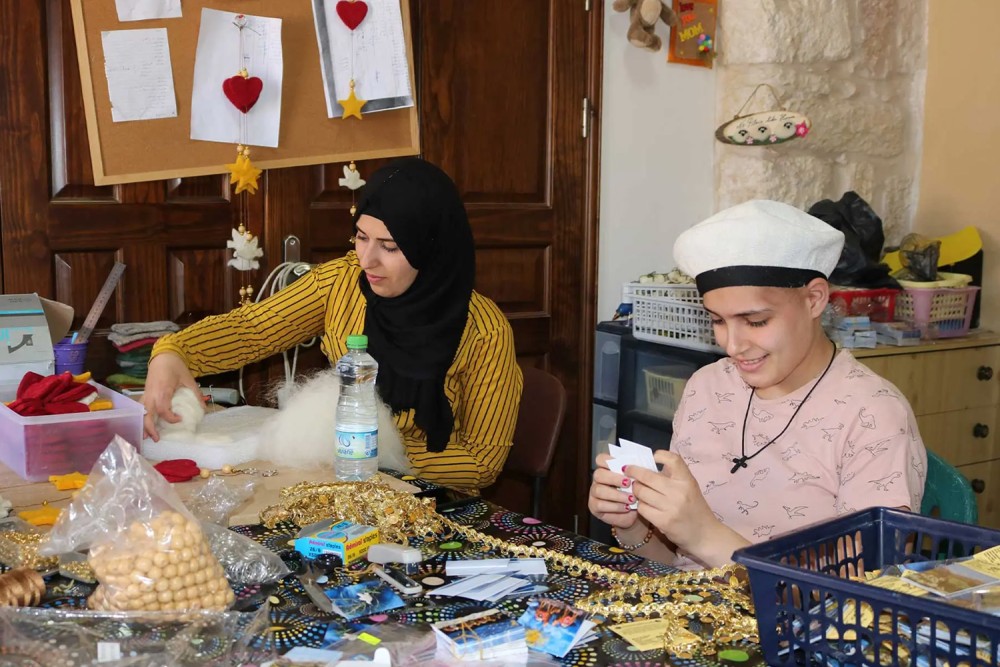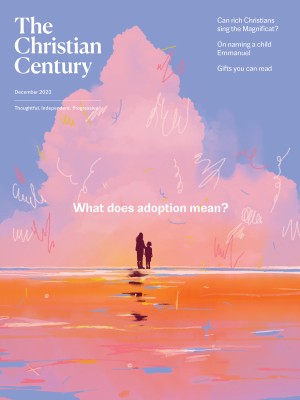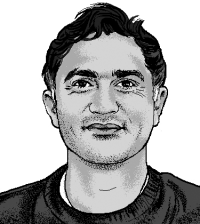Joyful life in Bethlehem
At a L’Arche community, I learned something about working and dreaming for peace.

Members of the L’Arche community in Bethlehem, Ma’an Lil-Hayat, work together at a crafting table. (Courtesy photo used by permission)
A few years ago in Bethlehem, early one morning, under the surveillance of watchtowers, I walked down the hill from the place where Christ was born—from the Church of the Nativity at the heart of the city. Winding through narrow alleys, I finally made it to Ma’an Lil-Hayat, the L’Arche house of Bethlehem. L’Arche is an international network of communities that organize their lives around people with disabilities.
When I arrived, everyone was already gathered in the main room. A woman greeted me with a smile and waved me to an empty chair. As soon as I sat down, a young man dashed from his seat across the room. He stood in front of me, almost on top of me, his eyes dancing—first glancing at my forehead, then the ceiling, then my beard, then the ceiling, only looking into my eyes for a flash of a moment, a flicker of mutual recognition. He smiled and, in a voice much louder than I’m used to, he said, “Yes.” Just one word, and then he rushed back to his chair.
Read our latest issue or browse back issues.
After their morning ritual of sharing and singing, the 30 people in the room divided up into five groups for a day of working on crafts. I was led to one of the rooms and, as I entered, I saw him again, seated at a table with four other people—and he saw me. He jumped from his chair, bouncing his way to me. He came to my side and pointed at the empty chair beside his. He said the same word again, as he pointed: “Yes.”
I took the seat beside him in the workshop, where baskets of wool are washed and felted into miniature sheep and caves for nativity scenes. I was asked to introduce myself. “Hi, I’m a pastor from the United States,” I said, “I’m here to visit, thanks for welcoming me as a guest.” I was going to say more, but I noticed that the man across the table began to move his lips. He spoke slowly, a syllable at a time. “Here. You. Not. Guest.” He took a deep breath. “You. Are. Friend.”
The rest of the group expressed their agreement, each in their own way. Seated next to me, my companion offered his same “Yes.” Across the table a woman smiled, giving me a subtle nod, rigid but full of warmth. Her eyes revealed more than she could say with words, more than the rest of her body would allow. From his wheelchair a man looked up from the wool in his hands. “Welcome,” he said, in perfect English. The person on my right had been talking quietly to herself the whole time, in Arabic. She glanced over at me while still speaking. The others around the table giggled. The man who spoke English translated for me as he laughed. “She said, ‘Welcome man with the beautiful beard.’” “Shukran,” thank you, I said, as I blushed.
I watched the five of them work, their hands busy with an artistry I did not know. When the person beside me noticed that I wasn’t doing anything, she took each of my hands in hers, put them on the bundle of wool in front of me, and moved my hands in circles, kneading the wool into the rough mat. “Hal tafham?” she asked. Someone began to translate, but she scowled at him and shouted a complaint. “She does not want me to translate,” he explained, rolling his eyes, chuckling. “She believes you will understand her if you just try hard enough.”
So I tried harder to understand, paying attention to the tone of her words, studying the expressions on her face, watching her work the wool. I learned slowly; she was patient with me. I copied her movements—dunking the bundle into the warm water, pushing it across the rubber grooves of the mat, skimming the suds into a bucket. She nodded at me and said words that sounded kind, an approval of my efforts, I assumed.
We worked together that day, despite my lack of artistry and my inability to speak their language. With gentleness and love the group welcomed me into their lives, into their work, and into their dancing, which happened during breaks as we gathered into a large room. Someone grabbed a drum. Tambourines were passed around. All of us stomped and clapped and spun around with the beat.
A L’Arche volunteer pulled me into the circle, and as we twisted and turned with the others, he leaned over to say something to me. “This is our struggle for peace,” he shouted over the singing. “This life together, here—every day we are fighting for life, by dancing, by singing.” Then he pointed to the scar on his cheek. “A reminder from years ago, another life,” he said, “when I did not understand how to strive for peace.”
As our break ended, my friend came back to my side, pointing the way to our workroom, saying his only word to me, “Yes.”
“His name is Rami,” the man with the scar told me. “In Arabic his name means ‘to dream.’”
My mind drifted back to the early morning, when I was laying in bed, before dawn, my first night there in Bethlehem. I awoke to the Muslim call to prayer, echoing from one minaret to another—the sounds of voices chasing one another and harmonizing in the night, of singing that sounds like dancing. Allahu akbar, “God is Great.” Hayya ‘ala-s-Salah, “Rise up for prayer.” As-salatu Khayrun Minan-nawm, “Prayer is better than sleep.” These lines are sung again and again, waves of sound pouring down from the sky.
After my day with the L’Arche community, that night I had a dream. My new friend Rami was in a minaret, singing his “yes” as the call to prayer, his words as music streaming through the alleys of the refugee camp, the joyful life of his song crashing against the West Bank Wall.







